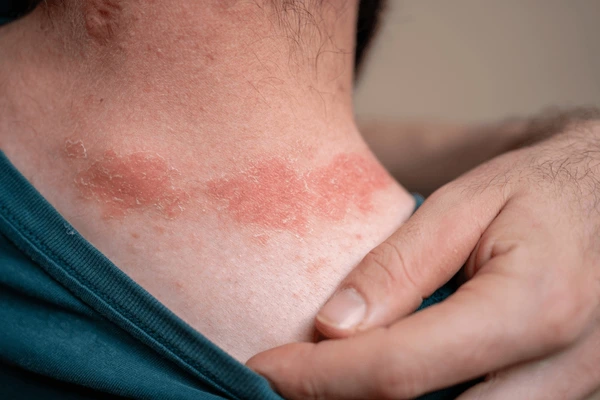
About
Psoriasis
Get advanced psoriasis treatment in Lucknow at The Velvet Skin Centre, Indira Nagar. Our expert dermatologist offers safe therapies to manage symptoms and restore skin comfort.
Book Appointment NowCall to book Appointment +91 8002558860

About
Get advanced psoriasis treatment in Lucknow at The Velvet Skin Centre, Indira Nagar. Our expert dermatologist offers safe therapies to manage symptoms and restore skin comfort.
Book Appointment Now
The knees, elbows, trunk, and scalp are the most typical areas of the body to develop a rash with itchy, scaly patches due to psoriasis.
Psoriasis is a frequent, chronic condition that has no cure. It may hurt, keep you up at night, and be difficult to focus on. The illness frequently goes through cycles where it will flare up for a few weeks or months before decreasing. Infections, cuts, burns, and specific drugs are common psoriasis triggers in persons with a hereditary predisposition to the condition..
There are treatments available to assist you in managing symptoms. In order to cope better with your psoriasis, you can also attempt different lifestyle choices and coping mechanisms.

At The Velvet Skin Centre, Indira Nagar, Dr. Asma offers comprehensive psoriasis treatment in Lucknow. Psoriasis leads to red, scaly patches on the skin and requires specialized medical attention. Using advanced therapies like phototherapy, topical treatments, and systemic medications, we manage flare-ups and restore skin health. With Dr. Asma’s care, patients achieve lasting relief, smoother skin, and improved quality of life.
Psoriasis is brought on by an overly reactive immune system that leads to skin inflammation.
Your immune system should eliminate foreign invaders like germs if you have psoriasis in order to keep you healthy and keep you from getting sick. Instead, your immune system could mistake foreign invaders for healthy cells. Your immune system therefore causes swelling or inflammation, which manifests as skin plaques on the surface of your skin.
In most cases, the growth and replacement of new skin cells takes up to 30 days. The period of time it takes for new skin cells to form is shortened to three to four days by your overactive immune system. Scales and frequent skin shedding are caused by the pace at which new cells replace dying ones on top of skin plaques.
Psoriasis is hereditary. Because biological parents may convey the disease to their offspring, psoriasis may have a genetic component.
An outbreak of psoriasis, also known as a flare up, is brought on by contact with a trigger, which may be an allergy or an irritant. Different people experience different psoriasis outbreaks. The following are typical causes of psoriasis flare-ups:
There is evidence of a hereditary susceptibility, although the exact cause of psoriasis is unknown. Psoriasis risk has been discovered to be increased by several genes. You will be more likely to acquire psoriasis than persons who do not have these genes if you inherited them from your parents.
Particularly, less than 1 in 10 children of parents with psoriasis will develop the condition themselves. If both parents have psoriasis, the likelihood rises to one in three.
But heredity alone cannot fully account for the occurrence of psoriasis. There are more elements that are involved.
Psoriasis risk factors are health and lifestyle choices that raise the likelihood of getting the condition, particularly in people who are genetically predisposed to it. Flare-ups may be caused by and made worse by the following factors:
The most typical psoriasis symptom is the development of dry, thick, and elevated patches on the skin. These patches frequently have a scale-like, silvery-white coating and might itch.
Psoriasis can induce a wide range of signs and symptoms in addition to the usual thickened, dry skin patches. What you perceive and experience varies depending on:
There are numerous ways to cure psoriasis symptoms. Typical psoriasis therapies include:
Small patches of your skin where the rash is present may only require creams or ointments to heal. You'll want more treatments if your rash covers a greater area or if you additionally experience joint pain. The presence of joint pain could indicate arthritis.
Your doctor will choose a course of action based on:
About
About
With multiple skin and hair care clinics across Lucknow, including The Velvet Skin Centre led by Dr. Asma – the best skin doctor in Lucknow and a trusted hair specialist doctor in Lucknow – we make expert dermatological treatments easily accessible, ensuring you receive the best care close to home.
Phone: +91 8002558860
Phone: +91 8002558860
Phone: +91 8002558860

Copyright @ 2025 The Velvet Skin Centre All Rights Reserved